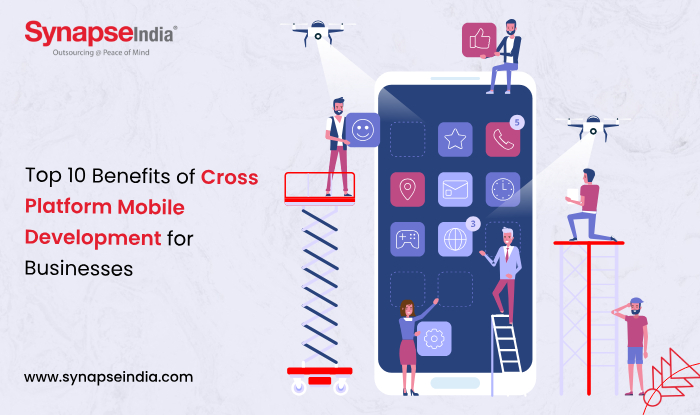 19 Dec 2024
19 Dec 2024
Whether you are a startup looking to make a mark or an established enterprise aiming to expand, cross platform development provides a scalable, efficient, and future-proof solution for your mobile application needs.”
Businesses that wish to thrive must have mobile applications developed aimed at their specific objectives. A custom mobile application can help expand their reach, engage customers, and boost revenues. But as simple as it sounds, the presence of multiple operating systems like Android, iOS, and windows, makes mobile app development a little complicated.
Most businesses face a dilemma in deciding which operating system they should go for to make the most of their mobile application. Cross platform mobile development is the answer to this dilemma, allowing businesses to build applications that operate on multiple operating systems using a single codebase. Not only does this approach maximize user engagement but it saves time and resources as well.

Cross platform mobile development involves creating applications that run on multiple platforms using a single codebase. Unlike native app development, which requires separate codebases for iOS and Android, cross platform development relies on frameworks like Flutter, React Native, Xamarin, and Ionic to streamline the process. These frameworks use programming languages such as JavaScript, Dart, or C#, making it easier to develop, maintain, and update applications efficiently.
As technology evolves, cross-platform development is becoming more and more sophisticated. Advanced tools, cloud-based development environments, and AI-driven optimizations are streamlining workflows and enhancing app performance. The rise of progressive web apps (PWAs) and the growing demand for seamless user experiences across devices further emphasizes the importance of cross platform development.
Do you want mobile apps that can reach a large base of users or offer a unified view across different platforms? Or ones that can be developed in a lower timeframe and cost you less too? Cross-platform development can help you achieve all these goals along with many others.
For the multiple benefits it brings to your business, creating mobile apps that function seamlessly across platforms has become imperative. The right cross platform mobile development services can help you create tailored mobile applications that drive profitable results for your business.
One of the most significant advantages of cross platform mobile development is its cost efficiency. Instead of hiring separate teams for different platforms, businesses can rely on a single team of developers to create a unified application. This eliminates the need to invest in two different native development processes, reducing labor and operational costs.
Additionally, maintaining and updating a single codebase is far less expensive than managing multiple ones. This financial advantage makes cross platform development particularly attractive for startups and small to medium-sized enterprises (SMEs) with limited budgets.
Cross-platform development allows businesses to significantly accelerate their app deployment process. Developers can deploy a single code across various platforms, thus reducing development cycles and ensuring a quicker time-to-market.
For businesses looking to seize market opportunities or stay ahead of competitors, cross platform development is an ideal solution to deliver their applications faster.
Developing an application that supports multiple platforms ensures businesses can reach a broader audience. Android and iOS together command the majority of the global mobile market share, and cross platform development allows companies to tap into both user bases simultaneously.
By providing consistent functionality and user experiences across platforms, businesses can engage with diverse customer segments and maximize their app’s potential reach.
Cross platform development thrives on the concept of “write once, use everywhere.” Developers can use a single codebase for multiple platforms, drastically reducing duplication of effort. This reusability not only saves time but also minimizes the potential for errors, as developers do not need to write and test separate codes for each platform.
The efficiency gained from code reusability directly translates into reduced development cycles and improved overall productivity.
Maintaining a consistent user experience (UX) across platforms is crucial for building a recognizable brand image and ensuring user satisfaction. Cross platform development frameworks enable developers to design uniform interfaces and experiences that work seamlessly on various devices.
Consistency fosters familiarity among users, encouraging them to stay engaged with the app regardless of the platform they use. This alignment builds trust and loyalty, enhancing customer retention.
Updating and maintaining mobile applications can be a daunting task, especially when dealing with separate native apps. Cross platform mobile development simplifies this process by centralizing updates and maintenance. Developers can implement changes in a single codebase, which will be shown across all platforms.
This ease of maintenance ensures quicker bug fixes, feature enhancements, and overall app improvement, providing users with a smoother experience and reducing downtime.
Modern cross-platform development frameworks come with an array of plugins, tools, and libraries that streamline the development process. These resources enable developers to integrate features like geolocation, push notifications, payment gateways, and social media sharing effortlessly.
Popular frameworks offer pre-built components and third-party integrations, which simplify the addition of complex functionalities. This ease of integration enhances the app’s performance and user experience.
Testing is an integral part of the development process to ensure applications function as intended. With cross platform development, testing becomes more efficient because there’s only one codebase to validate. Quality assurance teams can run tests simultaneously for multiple platforms, identifying and resolving issues more quickly.
The reduced testing time not only expedites the development process but also ensures a high-quality product is delivered to the market.
Cloud integration is essential for modern applications, providing scalability, data synchronization, and enhanced security. Cross platform frameworks are inherently designed to integrate seamlessly with various cloud services, enabling businesses to leverage powerful backend solutions.
Cloud integration allows businesses to store and retrieve data efficiently, ensuring a consistent experience for users across devices. This capability is especially beneficial for applications that require real-time data synchronization, such as messaging platforms and e-commerce apps.
The technology landscape is evolving, with new devices and operating systems entering the market regularly. Cross platform development offers flexibility and adaptability to keep up with these changes. The development frameworks are continuously updated to support the latest OS versions and hardware advancements.
This adaptability ensures that businesses can future proof their applications, minimizing the need for major overhauls and keeping their software relevant in the long run.
A cross platform mobile development company provides the technical expertise, strategic insights, and end-to-end support necessary to develop robust and scalable apps. Partnering with the best cross platform mobile development company is by far the easiest way to get the right apps developed for your business. Here’s how such a company can add value to your development process:
Cross-platform development companies specialize in popular frameworks. Their experienced teams understand the strengths and limitations of different frameworks, helping businesses choose the best technology stack to meet their needs.
A professional cross platform development company can analyze a business’s unique requirements, target audience, and goals to deliver customized app solutions. From UI/UX design to backend integration, these companies ensure that the app aligns with your brand and objectives.
Cross-platform development companies streamline the app creation process by using a single codebase for multiple platforms. This approach reduces the need for redundant work, saving both time and money. Businesses can focus on core activities while the development company handles the technical complexities.
By partnering with a cross-platform mobile development company, businesses gain access to skilled developers, designers, and project managers. These professionals bring in-depth knowledge of app architecture, platform-specific requirements, and performance optimization.
Cross-platform companies are well-versed in incorporating advanced technologies like AI-powered chatbots, AR/VR features, or IoT functionalities into apps. Their ability to integrate cutting-edge solutions ensures that the app remains innovative and competitive.
A reputable development company ensures that apps comply with industry standards, data protection regulations, and platform-specific guidelines. This focus on security and compliance builds trust among users and mitigates risks associated with data breaches.
Cross platform development companies have dedicated QA teams to test the app’s performance, functionality, and compatibility across devices and platforms. Their rigorous testing processes ensure a bug-free, high-quality product that delivers an excellent user experience.
A professional development company builds apps with scalability in mind, ensuring they can handle increased traffic, new features, or platform updates. This futureproofing saves businesses from costly overhauls as their needs evolve.

Cross platform mobile development is a game-changer for businesses seeking to maximize their digital presence while optimizing resources. From cost savings and faster time-to-market to wider audience reach and consistent user experiences, the advantages of this approach are compelling. By leveraging cutting-edge frameworks and tools, businesses can build high-quality applications that cater to diverse customer needs, ensuring sustained growth and success in an increasingly competitive market.

 22 Jun 2016
22 Jun 2016
